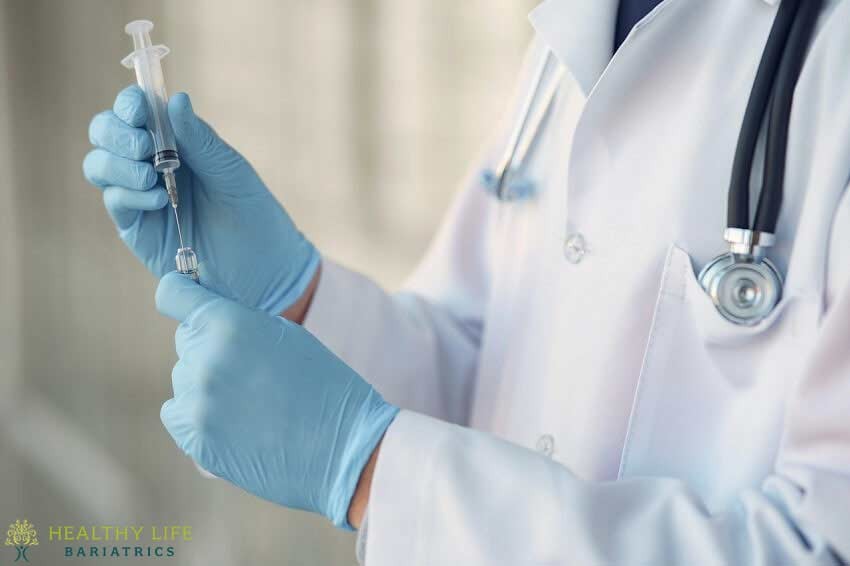
Bariatric (weight loss) surgery has been shown to be effective at helping patients shed excess amounts of weight. On average, patients can expect to lose forty to sixty pounds of their excess weight over the span of two years. Patients who do find success with bariatrics often think of their procedure as their newfound lease on life. The pounds drop away, they have more energy and their zest for life returns.
What Causes Heartburn and GERD?
Heartburn occurs when stomach acid flows back up into the esophagus, causing irritation and pain. This happens because the lower esophageal sphincter (LES), a ring of muscle at the bottom of the esophagus, weakens or relaxes and allows acid to reflux upward. Certain foods, obesity, pregnancy, smoking, and some medications can trigger heartburn or make it worse.
In GERD, that valve remains open for longer periods of time and more frequently, allowing a steady stream of acid to damage the esophagus over time. This chronic exposure can cause inflammation (esophagitis), ulcers, scarring, and Barrett’s esophagus (precancerous cell changes). Typical symptoms include burning in the chest or throat, regurgitation, trouble swallowing, and a sour taste.
Lifestyle Changes and Medications
The first line of treatment is lifestyle changes like avoiding trigger foods and eating smaller meals, along with over-the-counter antacids. For persistent GERD, stronger prescription medications called proton pump inhibitors (PPIs) block acid production more powerfully. While these strategies control symptoms in most patients, they don’t address the faulty valve itself. So once the medication is stopped, reflux can return. Up to 40% of patients remain symptomatic on optimized drug therapy.
When is Surgery Recommended?
Severe, chronic GERD not controlled by medical therapy and endoscopically proven esophageal damage are indications for surgery. Some patients who depend on PPIs for adequate control, but wish to come off long-term medication, may also be candidates. The goals are to reconstruct the malfunctioning valve, prevent further acid exposure, and allow the healing of inflamed tissue. For some patients, surgery can be a cost-effective solution compared to lifelong drugs.
When Does Bariatric Revision Become Necessary?
Some patients lose weight following their procedures only to find the scale creeping back up after a few years. Along with the return of obesity, these patients may experience acid reflux or sleep apnea. Bariatric revision surgery can be the answer to defeating obesity and treating obesity-related ailments.
How Common is Weight Loss Revision Surgery?
Around 10% to 20% of bariatric patients will seek out revision surgery. Most patients seek out revision two or three years after their original procedure.

At Healthy Life Bariatrics, Dr. Moeinolmolki can provide you with an official diagnosis for GERD during an initial consultation. The testing protocols for GERD diagnosis consist of endoscopy (a small camera that looks inside your esophagus for inflammation), upper GI series X-rays, esophageal manometry (checks for pressure inside the esophagus), and pH testing (to determine acid levels inside the esophagus).
If GERD is diagnosed, you could be a good candidate for surgery.
How is Surgery for GERD Performed?
Surgery for GERD is usually recommended as a last resort when even prescription medications won't help the heartburn go away.
The most common procedure for GERD correction is fundoplication. This is a procedure that increases the pressure in your lower esophagus. During the surgery, Dr. Moein winds the top portion of your stomach around the LES. This acts as a tightener for the sphincter muscle, allowing it to constrict when it's supposed to. A tighter LES raises the pressure in your lower esophagus, which prevents future instances of reflux. The surgeon performs laparoscopic surgery, which is minimally invasive and involves tiny incisions, small scars, and a short recovery time.
Exploring Surgical Options in Los Angeles
Fundoplication:
One of the most common surgical procedures for GERD in Los Angeles is fundoplication. During this procedure, the surgeon wraps the top of the stomach around the lower esophagus to strengthen the lower esophageal sphincter (LES) and prevent acid reflux. This can be done using minimally invasive techniques, resulting in shorter recovery times(1).
LINX Device Implantation:
A relatively newer option gaining popularity in Los Angeles is the implantation of the LINX device. This small, flexible ring of magnets is surgically placed around the LES, helping it stay closed to prevent reflux while allowing food to pass through(2).
Transoral Incisionless Fundoplication (TIF):
TIF is a minimally invasive procedure performed through the mouth. It involves using an endoscope to create a valve at the top of the stomach, reinforcing the LES and reducing acid reflux(3).
Advancements in GERD Surgery
Endoscopic Procedures:
Advancements in endoscopic techniques offer less invasive alternatives for GERD surgery. Endoscopic suturing and radiofrequency energy application are among the innovative approaches explored in Los Angeles, providing effective options with reduced recovery times(4).
Robotic-Assisted Surgery:
Robotic-assisted surgery is gaining ground in Los Angeles for GERD procedures. Surgeons control a robotic system to perform precise maneuvers, allowing for enhanced accuracy and dexterity in complex surgeries5.
What are the Benefits of General Surgery for GERD?
The main benefit of GERD surgery is that you won't experience heartburn or any of the accompanying symptoms like shortness of breath.
Repairing the source of GERD, such as a hiatal hernia, can also help to prevent further complications. Severe complications of GERD can include esophageal ulcers, esophageal stricture (where stomach acid damages your lower esophagus, leading to scar tissue), and lung problems.
Barrett's esophagus can also result, which is where the acid reflux alters the cells that line your esophagus, which can make you more susceptible to esophageal cancer.
Risks and Considerations
As with any operation, reflux surgery does carry risks like infection, bleeding, and adverse reactions to anesthesia. Specific complications may include trouble swallowing, gas bloating, or increased flatulence from the wrap. There is also a risk of the fundoplication coming undone over time in about 5-10% of cases.
TIF avoids some risks but has shown less durable reflux control. All procedures can induce side effects if the wrap is too tight. For this reason, these surgeries may not be advisable for patients with certain upper gastrointestinal motility disorders.
Postoperative Care and Recovery in Los Angeles
Dietary Guidelines:
After GERD surgery in Los Angeles, dietary adjustments may be necessary to facilitate healing and minimize reflux. Gradual reintroduction of solid foods and adherence to a GERD-friendly diet can contribute to a successful recovery6.
Medication Management:
While the goal of GERD surgery is to reduce or eliminate the need for medication, some individuals in Los Angeles may still require specific medications during the recovery period. This will be determined by the healthcare provider based on individual needs7.
Follow-up Appointments:
Regular follow-up appointments with healthcare providers in Los Angeles are essential to monitor the success of the surgery, address any concerns, and ensure a smooth recovery process.
Ready to Discuss Heartburn GERD Surgery?
If you have had enough of living with GERD symptoms, surgery can help. Dr. Babak Moeinolmolki and his compassionate surgical team look forward to treating you. If you live in Los Angeles, Encino, or Glendale, California, call today to schedule a consultation with world-class general surgeon Dr. Moeinolmolki who performs heartburn GERD surgery in Los Angeles CA – (310)807-2378.

